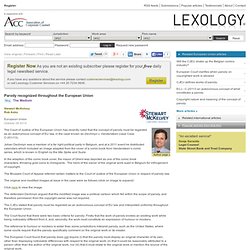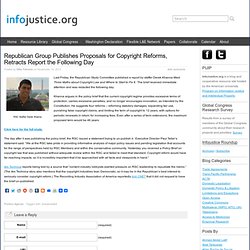

Discussion about copyright reform kicks off in the European Parliament - Euro... Discussion about copyright reform kicks off in the European Parliament - Euro... Issue in focus: the impact of intellectual property regimes on the enjoyment ... French | Spanish.

The IPKat: BREAKING NEWS: Pirate Party MEP Julia Reda proposes major overhaul of EU copyright. As copyright-oriented IPKat folks will be aware of, this year promises to be an interesting one at the EU level.

Not only because of the ever-active Court of Justice of the European Union (CJEU) [see here and here so far], but also because the new Commission intends to table proposals to reform the current acquis. Indeed a few days ago Günther Oettinger, EU Commissioner for Digital Economy and Society, once again made clear (once again, on Twitter), that having “modern copyright rules” is one of the key goals for 2015. What “modern” means is still not so clear, nor is [but see here] what legal instruments will be adopted – a directive? Soft law instruments like recommendations or a White Paper? In all this, also the European Parliament intends to contribute to the debate and likely reform action. Parody recognized throughout the European Union. The Court of Justice of the European Union has recently ruled that the concept of parody must be regarded as an autonomous concept of EU law, in the case known as Dechmyn v.

Vandersteen (case Case C‑201/13). Johan Dechmyn was a member of a far right political party in Belgium, and at a 2011 event he distributed calendars which included an image adapted from the cover of a comic book from Vandersteen’s comic series, which is known in English by the title Spike and Suzie.
UK reform of CopyR. Proposition de loi sur contrefacon adoptee par Ass. Republican Policy Study. EU copyright reforms should not permit systematic linking to inf. Customs and IP. Next January 1, 2014 the new (EU) Regulation No. 608/2013 will be applied regarding the supervision of customs authorities in respect of intellectual property rights.

This Regulation repeals the previous (EC) Regulation No. 1383/2003. This Regulation No. 608/2013 introduces a number of improvements to reinforce the protection of intellectual property rights by the customs authorities. Therefore, in order to toughen control in respect of intellectual property rights, it extends customs intervention to other types of infringements that until now have not come under the range of the previous Regulation No. 1383/2003. In this way, in addition to rights already covered by previous Regulation No. 1383/2003, the new Regulation No. 608/2013 includes the following within its range of applications: Therefore, as regards intellectual property rights, new Regulation No. 608/2013 refers to the following: And why this specifically?
Mònica López Lawyer / SNAbogados snabogados@snabogados.com.
Congressional hearing on the scope of copyright protection. Italian Communications Authority issues online copyright enforce. EFF taking CopyR back. Is copyright law set to be modernised? EU launches consultation on copyright reform. Modernising Copyright: the Irish plan. CC reforme du droit d'auteur. The RIAA Talks DMCA and Why it’s Not Working for Content Creator. Proposed parody exception to copyright infringement. MaxPlank collective management of copyright and related rights. Loosen up copyright law, says Dutch government. Les Pays-Bas pourraient assouplir leur droit d'auteur par un fair use. Depuis le Statute of Anne de 1709, la durée du monopole accordée par la loi à l'artiste a été continuellement rallongée, passant de 14 ans après la création de l'œuvre à 70 après la mort de l'auteur.
Ce droit d'auteur exclusif, qui devait être à l'origine un monopole temporaire, s'est ainsi considérablement renforcé au fil du temps, devant la norme au détriment du domaine public, vu comme une anormalité. Face à ce verrouillage, quelques gouvernements se disent prêts à assouplir les règles du jeu. S'il n'est pas évidemment pas question de tout remettre en cause, quelques États souhaitent se rapprocher de la position anglo-saxonne sur le droit d'auteur, en intégrant une dose de fair use (usage équitable). Celui-ci offrirait un contrepoids au droit d'auteur, en autorisant l'exploitation d'une œuvre selon certaines circonstances. Les Pays-Bas veulent assouplir leur droit d'auteur. Le ministère néerlandais de la Sécurité et de la Justice a ouvert cette semaine une consultation publique sur Internet, pour solliciter l'avis des citoyens sur une réforme qu'il envisage de mettre en oeuvre pour assouplir la loi sur le droit d'auteur, dont la première version date de 1912.

L'objet principal de cette réforme consisterait à durcir les critères pour décider qu'une oeuvre est digne de protection par les droits d'auteur. Mais pas seulement. Fight for the Future, defending our basic rights and freedoms. Case Summary: Expert Reports In Copyright Infringement Cases. Often the highest hurdle to clear when an author sues someone for copyright infringement is proving that the defendant had access to the plaintiff's work.

This is necessary to show that the defendant copied the plaintiff's work. A work independently created does not infringe anyone else's work even if substantially similar. In an infringement case brought in New York, plaintiff Craig Mowry claimed that the screenplay for the motion picture "The Truman Show" was stolen from his screenplay, treatment and character profiles for "The Crew. " He sued Viacom International; producers Paramount Pictures, Scott Rudin and his company Scott Rudin Productions; and screenwriter Andrew Niccol. Since evidence of direct access is often difficult to prove, Mowry hired Dr. New evidence-based copyright reform campaign launched in the US. As this Kat learnt from her own copy of seminal book A to Z of Style, legendary Christian Dior once said: "In town you cannot be dressed without gloves anymore than you can be dressed without a hat".

Transferring this basic rule to the equally fashionable realm of copyright, it seems that nowadays you cannot go around speaking of its possible reforms without mentioning that these have to be evidence-based (if you want to know what evidence means, you can learn it here and here) Not a long time has passed since the publication of Ian Hargreaves's report entitled Digital Opportunity. As UK-based readers will remember,the need for an evidence-based approach to IP (in particular copyright) reforms was advocated therein. The Caucus of House Conservatives. That Was Fast: Hollywood Already Browbeat The Republicans Into Retracting Report On Copyright Reform. So, late Friday, we reported on how the Republican Study Committee (the conservative caucus of House Republicans) had put out a surprisingly awesome report about copyright reform.

You can read that post to see the details. Republican Group Publishes Proposals for Copyright Reforms, Retracts Report the Following Day. RSC Staffer Derek Khanna Last Friday, the Republican Study Committee published a report by staffer Derek Khanna titled Three Myths about Copyright Law and Where to Start to Fix It.

The brief received immediate attention and was redacted the following day. Khanna argues in the policy brief that the current copyright regime provides excessive terms of protection, carries excessive penalties, and no longer encourages innovation, as intended by the Constitution. He suggests four reforms – reforming statutory damages, expanding fair use, punishing false copyright claims, and limiting the term of copyright to 12 years, with options for periodic renewals in return for increasing fees.
Even after a series of term extensions, the maximum proposed term would be 46 years. Is the term of protection of copyright too long? Last Friday the Republican Study Committee published a policy brief entitled "Three Myths About Copyright Law and Where to Start to Fix It", which Techdirt labelled as "surprisingly awesome". The brief analysed the "possible reforms to copyright law that will lead to more economic development for the private sector and to a copyright law that is more firmly based upon constitutional principles".
It argued that the current US copyright regime has retarded the creation of a robust DJ/Remix industry, hampers scientific inquiry, stifles the creation of a public library, discourages added-value industries and penalises legitimate journalism and oversight.